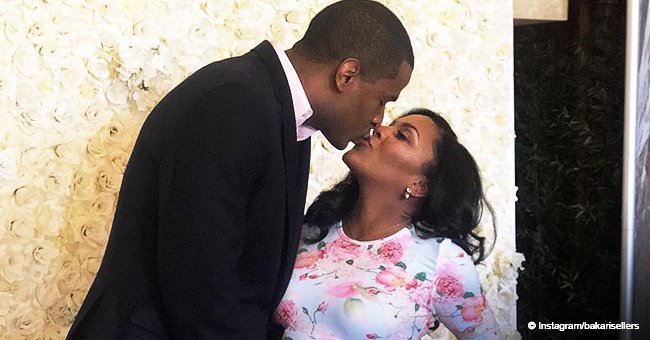
CNN's Bakari Sellers’ Wife Ellen Reveals She Almost Lost Her Life While Giving Birth to Twins
A couple of months after giving birth to her twins with Bakari Sellers, Ellen Sellers opened up about her scary experience after childbirth when she almost died. She recalls her husband's reaction after she passed out and when nurses weren't responding to his calls for help.
Bakari Sellers and his wife, Ellen Rucker Sellers welcomed a set of twins earlier this year. But their delivery wasn’t as pleasant as the couple hoped it to be. Ellen opened up to Madamenoire recently and revealed the ordeal she went through after childbirth and how she almost lost her life waiting for doctors to attend to her at the hospital.
BREEZING THROUGH PREGNANCY
Ellen’s pregnancy was a breeze despite her difficulties conceiving. After a missed attempt at IVF and switching doctors from a Caucasian man to an African American woman, she finally discovered she was carrying twins. Ellen knew she was at high risk but doctors assured her she’d be fine as long as she took care of herself.
REJOICING AT THE BIRTH OF TWINS
On the day she gave birth, the twins arrived four minutes apart and without any problems. Ellen and Bakari spent time with the babies and the new mom started to nurse them. However, later that day, Ellen recalled feeling hot and would later learn that she passed out soon after.
GOING THROUGH A LIFE-THREATENING ORDEAL
Bakari panicked and tried to get help from nurses who didn’t seem to be responding to him. It was around 11 pm and their doctors weren’t around. Nurses were supposed to be on duty but they were nowhere to be found. Ellen had vomited and while an upset Bakari tried to clean her up, he was also "out of the door screaming down the hallway, like, 'Somebody help my wife!'" Ellen recounted. "And nobody was responding to him. That was five minutes or so of no response or maybe even longer, maybe even ten minutes or so."
Ellen was in and out of consciousness. When doctors finally came, they discovered that she went into hemorrhagic shock. She ponders things would have been worse if she didn’t get the immediate attention she needed especially since there were things we never know.
“You just never know, you never know what your body will do. My body just flipped out over me having twins and my fibroid. My fibroid grew to a bigger size than what we thought it had. It had grown to a peach size.”
Ellen is also grateful that her husband was there to advocate for her and make sure she was tended to.
“I can’t put words to how important that is. It was almost impossible for him to be [calm] because my body was just in total shock. But, to have him as an advocate, I’m so lucky. I feel so blessed to have someone that was aware and not scared and any of those things going into it.”
ADVOCATING FOR MATERNAL CARE
As a result of her experience, Ellen is now pushing for greater awareness of the risks of pregnancy especially for African-American women so people would listen more when problems during childbirth arise. It is a fact that Black women are three times more likely to die from childbirth than White women. With the help of Ellen’s hair care line, Rucker Roots, she hopes to use part of her proceeds to advocate for maternal care with the end goal of lowering the mortality rate of mothers and their babies at childbirth.
FIGHTING FOR HER LIFE
Ellen isn’t alone in her plight. Tennis superstar Serena Williams also feels strongly about this since she too almost died after giving birth to her daughter, Olympia.
Serena suffered from a pulmonary embolism which resulted in a hematoma in her abdomen. It required her to undergo a couple of surgeries just hours after giving birth to her child.
The harrowing ordeal made the one-time-mom realize how lucky she was to have in her disposal the money and team of doctors she needed to survive the experience. However, it was also a glaring reminder of how others weren’t as privileged.
This prompted her to encourage people to find ways to help in the improvement of maternal health care so it becomes accessible to everyone. She believes the united power of a group of people can make a big difference in saving the lives of at-risk pregnant mothers and their children.
